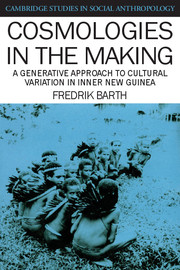Book contents
- Frontmatter
- Contents
- Foreword by Jack Goody
- Map: Major territories of the mountain Ok
- 1 The problem
- 2 An attempt at systematic comparison: descent and ideas of conception
- 3 The possible interrelations of sub-traditions: reading sequence from distribution
- 4 The context for events of change
- 5 The results of process – variations in connotation
- 6 Secret thoughts and shared understandings
- 7 The stepwise articulation of a vision
- 8 Experience and concept formation
- 9 The insights pursued by Ok thinkers
- 10 General and comparative perspectives
- 11 Some reflections on theory and method
- Bibliography
- Index
- Cambridge Studies in Social Anthropology
9 - The insights pursued by Ok thinkers
Published online by Cambridge University Press: 05 June 2012
- Frontmatter
- Contents
- Foreword by Jack Goody
- Map: Major territories of the mountain Ok
- 1 The problem
- 2 An attempt at systematic comparison: descent and ideas of conception
- 3 The possible interrelations of sub-traditions: reading sequence from distribution
- 4 The context for events of change
- 5 The results of process – variations in connotation
- 6 Secret thoughts and shared understandings
- 7 The stepwise articulation of a vision
- 8 Experience and concept formation
- 9 The insights pursued by Ok thinkers
- 10 General and comparative perspectives
- 11 Some reflections on theory and method
- Bibliography
- Index
- Cambridge Studies in Social Anthropology
Summary
To press my analysis one step further, I need to generalize and abstract from the materials we have uncovered. I shall focus on two tasks: (1) to define the subject-matter of Ok cosmological constructs – what are the phenomena in the cosmos which are given systematic attention? and (2) to characterize the kinds of understanding and insight that are produced in this tradition of knowledge. Only when we are able to characterize these substantive features do we arrive in a position where we can ask further questions of ‘why?’: we need a clear formulation of just what it is that we wish to explain.
Questions which have preoccupied Mountain Ok cosmologists in the present century seem to have been articulated in two distinct and partly opposed positions. On the one hand, many Ok hold that an elaborate and correct male cult of ancestors generates a sacred force of growth and fertility which overcomes and replaces carnal female fertility and provides the basis for constituting organized society. Alternatively, others hold that the source of life force lies in the synthesis of a purified male principle, regulated and granted through male cult of the ancestors, and an immanent female principle represented by female substances. The former position is characteristic of the Faiwolmin. The latter position has had its centre in Telefolmin and has had a heavy impact west- and southward on Tifalmin, Wopkaimin, and the fringe of the Faiwolmin.
- Type
- Chapter
- Information
- Cosmologies in the MakingA Generative Approach to Cultural Variation in Inner New Guinea, pp. 65 - 73Publisher: Cambridge University PressPrint publication year: 1987

